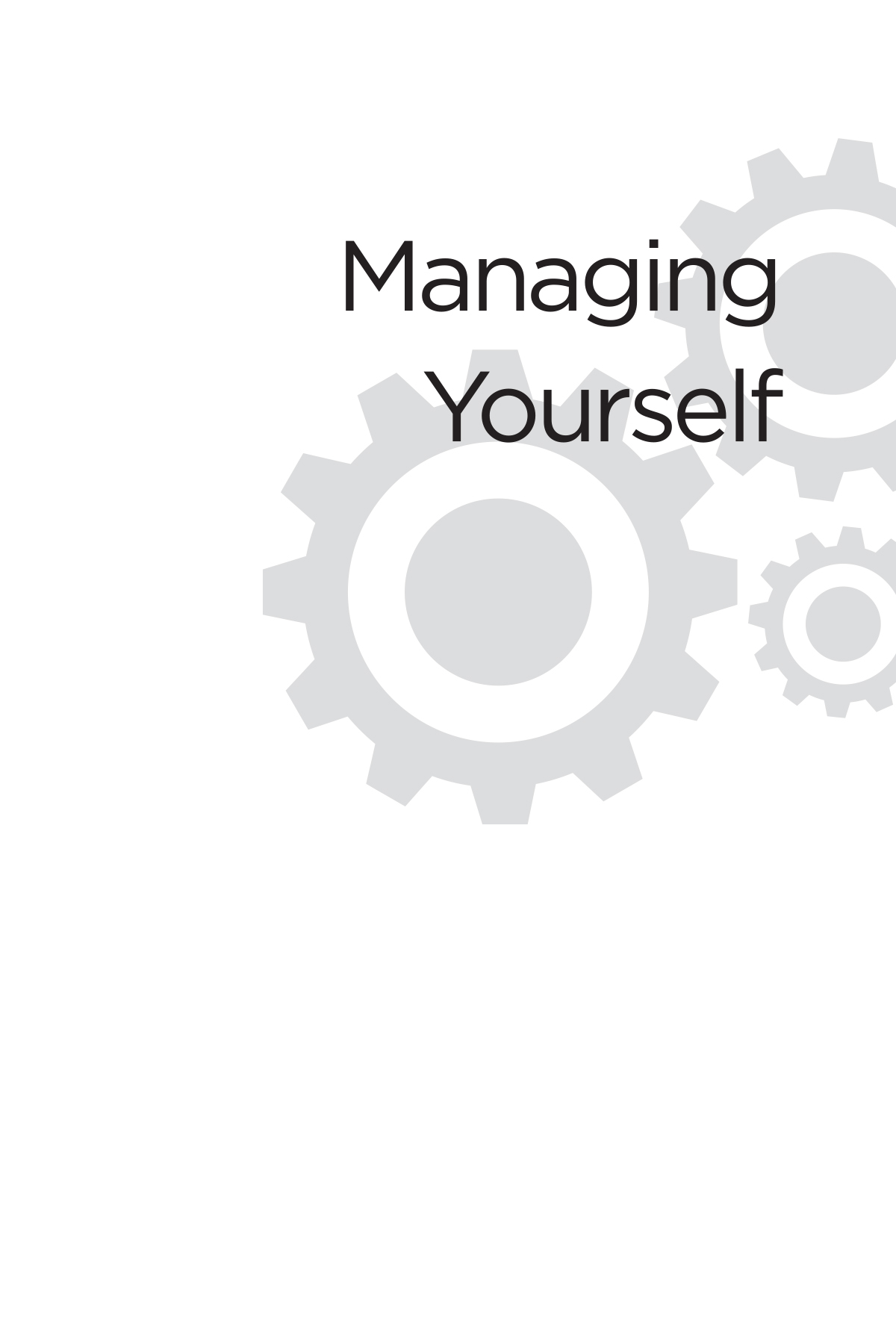
Worrying about what other people think of us can be paralyzing. We stop taking chances and play it safe. Our careers suffer. To fight these anxieties, develop a personal philosophy that articulates your sense of who you are. What values drive your actions? Who has qualities that align with yours, and what are they? What makes you feel that you’re performing at your best? How do you want to live your life? Write down your answers and look for what they have in common. Use the words that stand out to come up with your personal philosophy. Then commit to living by it. When something at work starts to lower your confidence, let your philosophy remind you of why you do what you do. Shut out others’ opinions and focus on the things that really matter.

When faced with a tough challenge, you may feel uncertain and even afraid. But it’s hard to inspire your team if they sense that you’re intimidated. You can project confidence by doing four things. First, demonstrate empathy for your team members. They want to know that you aren’t out of touch with their feelings. Second, communicate your vision for the team and that tough challenge. People need to have a clear sense of where they are headed. Third, set a direction. Show the team how you’ll reach the vision together. Last, give people proof so they have a reason to buy in to what you’re telling them. Offer evidence for your direction and optimism. Be specific, be personal, and reference the work that the team is already doing to build their confidence and your own.

To make good decisions, think critically. Too many leaders accept the first solution proposed or don’t evaluate a topic from all sides. To guard against these mistakes, you can hone your critical thinking skills. First, question your assumptions, especially when the stakes are high. If you’re coming up with a new business strategy, for example, ask: Why is this the best way forward? What does the research say about our expectations for the future of the market? Second, poke at the logic. When evaluating arguments, consider if the evidence builds up to a sound conclusion. Is the logic supported by data at each point? Third, seek fresh perspectives. Relying on your inner circle to help you think through these questions won’t be productive if they all look and think like you. Ask other people to question and challenge your logic.

High achievers often have lofty aspirations for self-improvement. But big goals such as “meditate for an hour every day” or “read more” are often more burdensome than sustainable. So, start small by focusing on “microhabits,” more achievable behaviors that you build over a long time. These habits should be ridiculously small, like meditating for thirty seconds or reading a paragraph each night. Piggyback on a daily task. Perform your new action at the same time as (or right before) something you already do every day. Read that one paragraph while brushing your teeth. Meditate while waiting for your coffee to brew. Then, track your progress, but keep it simple. Try using a “yes list” where you write down the desired action, and under each date, simply note a Y or N to indicate if you completed the task. Once you’ve accrued several weeks of Ys, you can increase your microhabit by a small increment, say 10 percent. Continue these incremental adjustments until the new habit is part of your muscle memory. By starting small, you can achieve big results.

Perfectionism can push you to excellence, but it can also increase your anxiety and lower your productivity. Learn when to let go and move on. Create a checklist of a task’s essentials. If you’re working on a client pitch, for example, make sure the presentation addresses the client’s major concerns and details why the client should hire your company. Your inner perfectionist might fret over the font choice and every semicolon, but once your checklist is complete, slowly back away. Or ask a trusted colleague to help you get perspective. Do you need someone to tell you when your first draft is good enough or when you should stop nitpicking? High standards are great, but they shouldn’t keep you from getting your work done.

When you have a never-ending to-do list, it’s easy to feel guilty about what you haven’t finished. But guilt is useful only when it motivates you to get more done—it shouldn’t make you feel ashamed. To ease these kinds of emotions when they arise, exercise self-compassion. Imagine what you’d say to a friend who felt bad for being behind on a few projects. Chances are you’d tell your friend not to worry about it so much, so tell yourself the same thing. You can also make yourself feel better by focusing on what you have been able to accomplish. Keep a “done list” in addition to your to-do list, so you can remind yourself of past work. Remember that all that work you have to do will be there tomorrow, whether you feel guilty about it or not. So, cut yourself some slack, take a breath, and just do your best.

If your workspace is a mess, you might be too. Research shows clutter adds to our stress and anxiety levels, detracts from our ability to focus, and makes us seem less conscientious and agreeable. Make a habit of tidying your workspace. Block off a few minutes on your calendar every week to sort through your piles of stuff. When it comes to managing digital clutter, ask IT for tools to organize online documents and advice on which items you can discard. For your home workspace, set up a designated area so that you have a boundary between work items and home items. (Research has also found that messy environments can encourage creativity; you just don’t want your desk to get too chaotic.)

Being a beginner at something can feel awkward and embarrassing, especially if you’re used to being an expert. But those feelings are inescapable growth pains that come from developing and improving. To get used to the discomfort, know that it’s brave to be a beginner. Exposing your weaknesses and trying new things takes courage. Make the challenge a bit easier by looking for learning situations with low stakes—maybe a class where you’re not expected to be an expert or you don’t know anyone else. If it helps, tell fellow participants that you may mess up whatever you’re about to attempt. Your willingness to take risks may inspire others to do the same. Don’t stop learning. Keep pushing yourself, especially in the areas where you are accomplished, so you can get even better. If you are willing to feel embarrassment and shame, and even to fail, there’s no end to what you can do.

We all need to keep learning new things to grow in our careers. But sometimes the urgency of our schedules gets in the way. To find time for learning, make it a part of your day-to-day tasks. Pick up skills from those around you. Notice how your boss handles a negotiation; ask salespeople about industry trends; get feedback from your peers after you give a presentation. At times, something may pique your interest, but you’re too busy to explore it. Try creating a “to-learn” list: write down concepts, ideas, and practices that you want to return to later. And create a learning channel for your team, whether it’s through Slack, SharePoint, or somewhere else, where you add links to valuable resources.

When you make a mistake at work, do you replay it in your head for days or even weeks? This overthinking is called rumination and can lead to serious anxiety. To break out of the cycle, identify your rumination triggers. Do certain types of people, projects, or decisions make you second-guess yourself? Notice when (and why) a situation is causing you to start overthinking. Distance yourself from negative thoughts by labeling them as thoughts or feelings. Instead of saying “I’m inadequate,” say “I’m feeling like I’m inadequate.” These labels help you distinguish what you’re experiencing from who you are as a person and an employee. Distract yourself. When your brain won’t stop spinning, do any simple activity you can focus on for a few minutes, like taking a walk or meditating.

Sometimes the smallest action, or inaction, can have a big effect on how we feel about our colleagues. Imagine that you emailed a coworker days ago and they haven’t replied. You might think the person is being rude, but they may just be under a tight deadline and feel bad about the delay. When you encounter situations, consider their broader context before jumping to conclusions. When a colleague’s behavior is affecting you negatively, ask yourself if they could be focused on an important project for the boss. Is something in their personal life distracting them? How would the situation look to an outside observer? Is anything amiss or just seem that way because you’re caught up in it? Assume the best about people—and try not to take things personally.

When feedback is unexpectedly harsh, your first instinct may be to run and hide. Four steps can help you react productively:
- Collect yourself. Breathe deeply and notice how you’re feeling. Silently labeling your emotions (“I’m feeling hurt and ashamed”) can help you distance yourself.
- Understand. Ask the other person for detailed examples of the behavior highlighted. Listen calmly, as if the conversation is about someone else.
- Recover. Tell the person that you need to reflect and will respond when you can. Don’t agree or disagree right away with what you’ve heard. Take some time to process and evaluate it.
- Engage. Think about the validity of the feedback. Even tough criticism usually has a kernel of truth, so look for it. Then, share your thoughts with the person again.

Because critical feedback is jarring and threatening, it tends to stick in our brains. But positive feedback is invaluable for learning about your strengths and growth areas. Save the praise you get, anything from thank-you cards to written notes in your evaluations to comments in email threads. When you get mixed feedback, tease apart the positive and negative aspects, and put the positive ones in your kudos folder as well. Periodically review and reflect on what you’ve saved. What patterns or themes can you identify? How could you use your strengths in new situations? What else can you learn about your strengths, and who might provide that perspective? You may feel immodest or uncomfortable basking in positive feedback. But someone has gone out of their way to highlight what you’re good at, so use it.

One way to get feedback that will help you improve is to build a culture where it’s safe for employees to be honest. Show colleagues that you want to know what they think, especially when they might hesitate to tell you. Ask open-ended questions and listen carefully to the answers: “What did you hear when I shared my strategy?” or “How did it feel to you when I sent that email?” Tell your team that you want both positive and negative comments, and then resist the urge to respond to what they say; even if you disagree, simply listen and reflect. Thank your team for their honesty and use their feedback to make necessary changes.

If you’re not always clear how you should think about growing in your career, try writing a “from/to” statement that articulates where you are today and where you want to go. For example: “I want to progress from an individual contributor who adds value through technical expertise and closely follows others’ directions, to a people leader who creates a clear strategy and delivers results through a small team.” To write a from/to, ask trusted superiors and colleagues for their candid view of your current role and goals. Ask them to be brutally honest, because their transparency will help you figure out how you need to grow. Reflect on their answers and incorporate them into your from/to statement and then have your advisers read it to provide a reality check. Sometimes people think they’re far ahead of where they are or choose an unrealistic destination.

When you’re starting your career, should you hold out for your dream job or take anything you can get? The answer is “a little of each.” There is value to be had from almost any role, so while you search for that ideal match, pay the bills with jobs that give you one (or more) of three things: experience, credibility, or income. You’ll need the right skills and background to land your dream job, so in the meantime, look for roles that will let you build relevant experience. And consider jobs at companies with great reputations, even if the job in question isn’t your exact goal. Having a top company on your résumé will make you stand out both now and in the future. Of course, sometimes you just need a paycheck. When all else fails, do what it takes to duct-tape an income together.

Why do people get trapped in a mid-career rut? In some cases, after succeeding early on, they play it safe rather than taking the risks that would help them advance. As a result, they feel stuck in the status quo. If this situation sounds familiar, don’t just hope things will change—get help. Find a trustworthy mentor who has navigated the same challenges. During your meetings together, discuss the tough work situations you’re facing, and ask about their experiences and how they push themselves to keep growing. You could also find an executive coach to meet with regularly. A good coach will help you understand what’s holding you back and explore options for your future. And do some reflecting on your own, too. Think about whether you still get satisfaction from your job, whether you’re playing it safe, and where you want your career to go next.

If you want to continue working in some capacity after you retire, you’ll have to plan. Ask yourself four questions:
- How much money do I need to earn? If a certain income is mandatory, this criterion has to come first and will influence your other decisions.
- How much location independence do I want? If you have visions of balancing some work with a lot of travel, or if you’d like to spend winters in sunny climes, think carefully about how to cultivate a location-independent second act, such as a seasonal or internet-enabled job.
- How much change am I seeking? If you’d simply like to downshift in your current career, ask your manager about transitioning into a consultant role. A bolder change will require additional groundwork.
- How can I start test-driving my future career now? Experiment with some small side projects while you have the security of your regular income.

No one likes to do “office housework”—low-importance tasks such as ordering lunch and taking notes in meetings. But research shows that certain groups of people, including women and people of color, are more likely to be assigned this kind of work, and that taking it on can hurt their careers. When faced with office housework, what should you do? First, have a prepared answer about how your time would be better spent: “I was hired to do X, and this new task would take away time from completing X well.” For on-the-spot requests like ordering lunch, you might say, “I really need to be present during that meeting, as it’s critical to what I’m working on.” When you say no to housework, offer to do something of higher value instead. And if you can’t say no, make sure that people are aware of the extra work you’re doing and that you at least get credit for it.

Think about an activity that you don’t always enjoy doing—delivering performance reviews, for example. Now ask yourself why you do it but ask four times. The first time you ask “Why do I do this?” you might answer, “Because I have to” or “I want to let my people know where they stand.” Then ask a second time: “Why do I want to let my people know where they stand?” The answer here might not be inspiring: “Because it’s part of my job.” But the answer might also start to sound more meaningful: “So that people can know how they can reach their career goals.” Then ask a third time: “Why do I care if people know how to reach their career goals?” Continue for one more iteration. By the fourth round, you’re likely to uncover a meaningful reason behind the activity—and a motivation for doing it well.

The volume of information and stimuli coming at us every day makes it more difficult to focus than ever. To do the careful thinking that decision making and leadership require, you must step back from the noise of the world. Schedule fifteen-minute breaks at least once or twice a day to sit quietly in your office or take a walk. Commit to these breaks as you would any meeting or appointment; if you don’t schedule moments of quiet, something else will fill the time. Use the time to think about your to-do list, especially the tasks you should stop doing. Solitude gives you the space to reflect on where your time is best spent. Try to get clarity on which meetings you should stop attending, which committees you should step down from, and which invitations you should politely decline.

Moving into a leadership position for the first time can be one of the most stressful moments in your career. To weather the transition, start by shifting your mindset. Focus on what excites you about the switch, not on what scares you. This will help you relax into your role and mitigate self-doubt. Practicing mindfulness techniques, such as meditation and controlled breathing, will develop your ability to stay calm and poised in challenging situations, such as running a contentious meeting or making a high-stakes decision. Lastly, you won’t succeed unless you take time to care for your overall health. You may be strapped for time, but don’t put off going to your annual medical checkup or finding a therapist if you’ve been struggling mentally. Sound sleep, regular exercise, good nutrition, and mental health are especially important when taking on a new role.

Focusing can be hard with all that beeping from your phone. There are simple ways to reduce distractions. Turn off push notifications. If that doesn’t help, use airplane mode to limit interruptions when you’re trying to focus. If being out of touch gives you anxiety, make exceptions for specific numbers, such as those of loved ones or important business colleagues. Check email, instant messages, social media, and text messages in batches, rather than sporadically throughout the day. Quickly checking anything, even for one-tenth of a second, can add up to major productivity losses; it can take an average of twenty-three minutes to get back in the zone after switching tasks. It’s OK to not respond immediately. In addition to giving you more uninterrupted focus time, delaying can lead to better decision making by giving you more time to think about your response.

Whether you’re seeking more money, higher status, increased visibility, additional resources, or more time off, you likely won’t get it if you don’t ask your boss for it. Make your request a win-win by using phrases that imply joint success, such as “How can we both do well?” Then respond with “what ifs.” For example, if your boss says that you need more experience before you can advance, you might reply with an exact strategy: “What if I take the lead on our communications strategy with the sales team?” Even if you get an initial no, you can still leave the negotiation with a small win that may put you on the path to an eventual yes.

Creativity can fade when you get bored or discouraged at work. To get your creative juices flowing again, change your habits. Try something new every month. Meet new people at work. Talk to new clients. Look for intersections—places where your department’s work overlaps with another. Volunteer for a cross-functional activity. And seek obstacles as opportunities for research and analysis. (Why is it there? Whom does it serve? What are its effects? What are other ways of getting the results you’re looking for?) Start by selecting obstacles you can change and continue on from there. Find ways to share what you know with others—write an article, lead a training session, or mentor a young upstart.

When you’re faced with a tough call, consider two things that make these decisions so difficult: uncertainty about the outcome and value complexity, the notion that any choice you make will negatively affect someone. To reduce the uncertainty in a decision, first consider the costs of not acting, and then think carefully about your options. Have you made any assumptions that are holding you back? Are there low-risk, small-scale ways to test your options? To handle value complexity, consider how you can help people understand your decision once you make it. Especially when the decision involves trade-offs that will affect others, you’ll want to be as clear as possible about your intentions.

You can’t do deep, creative work when meetings constantly disrupt your flow and hurt your productivity. To have time and space to focus, establish one day a week when nothing can interrupt you—no texts, no emails, no phone calls, and absolutely no meetings. Block this day off on your calendar and tell colleagues that you’ll be unreachable because you’re working on critical projects. Something urgent may come up anyway but try to keep the day from being compromised. Stick to a simple rule: you can move your unreachable day around—maybe it’s Wednesday one week and Thursday the next—but you can’t remove it from your calendar or push it to the following week. As you get into the routine of taking days for focused work, it’ll be easier for you, and the people around you, to keep them sacred.

There are many reasons people feel burned out at work—an overstuffed to-do list, tasks that seem meaningless, a lack of connection with others. One of the largest contributors to burnout is feeling that you lack control. If you don’t have autonomy in your job or a say in the decisions that affect your professional life, it can take a toll on your well-being. When you find yourself feeling not in control, step back and ask why. Does your boss contact you at all hours, so you’re always on call? Are the team’s priorities constantly shifting, so you can never get ahead? Once you know the reasons, figure out what you can do to address them. Maybe you could establish better boundaries with your boss or get the team to agree that certain priorities will remain constant. Having control in even a few areas can help you avoid burnout later on.

How do you motivate yourself when a project doesn’t have a deadline? Try making one up. Pick a date that you want the work done by or set aside some time for it each day or week. Create accountability by enlisting positive peer pressure. Tell a colleague what your deadline is (even if you picked it) and send them updates regularly. For additional motivation, incentivize yourself. For example, after spending a morning on the project, you might treat yourself to lunch. Or work from your favorite coffee shop, as long as you finish the project’s next step. If those incentives aren’t powerful enough, try penalties. Decide that if you don’t complete the task as planned, you won’t be able to listen to your favorite podcast or watch your favorite TV show tonight.

If you’re struggling to balance your individual work and the work of leading your team, reset your priorities. Seek out leaders who find that balance and ask how they do it. You can also ask them for feedback on your efforts. Use the feedback to think about ways you can give employees what they need, whether it’s holding regular career development conversations, pausing to acknowledge a colleague’s efforts, or closing your laptop to focus in one-on-one meetings. Over the next few weeks, notice when you feel a task or deadline pulling your attention away from a direct report. Remind yourself to focus on the people you’re leading. You’ll be able to get back to your to-do list soon enough.

Small changes to your work style could end up saving you hours each week. For instance, before eagerly jumping into a new project, talk to stakeholders about their expectations so that you know what to prioritize. Maybe they want a detailed project plan, but maybe a rough outline would get the job done, too. It’s also helpful to ask yourself if you could reuse any past work to complete the project at hand. Say you’re preparing a presentation to senior leaders. Can you pull language from the proposal it’s based on or draw on other materials to flesh it out? Last, use “timeboxing” to organize your efforts. Decide in advance how long you will spend on each task and stick to it. Even if you don’t finish everything in the allotted time, timeboxing will help you focus for short bursts of productivity.

When your life is disrupted by a big life event—a job change, a baby, a relative’s illness—how do you maintain your focus and well-being? Add some stability to an unstable time by making sure your habits align with your long-term goals. Think about the five to ten things you need to do every week to keep your life on track and list them. Many critical habits fall into one of four areas: personal reflection, professional reflection, relationships, and health (both physical and mental). You should also think about how you’ll create accountability for yourself. Will you post the list where you’ll see it often? Use an app to set reminders? Check in with a friend each week? Creating and reinforcing habits this way can assure you that you’re doing what you need to—no matter how many things you’re juggling.

You’re unlikely to make progress on your professional development goals if they feel like a chore. Instead of focusing on things you “should” do, choose one or two areas of focus that align with what really matters to you. Ask yourself:
- If I could accomplish just one major professional development goal this year, what would it be?
- When I think about this goal, do I get excited about the prospect of working on it as well as achieving it?
- Do I want to achieve this goal because it’s interesting and important or because I think it would please other people?
Use the answers to come up with a short list of goals that truly match your personal ambitions.

Constant access to data is killing our productivity. We begin the day by picking up our phones and getting lost in a stream of notifications and information. You can do three things to carve out more time and remain focused and effective at work:
- Start your day right. When you wake up, don’t start checking email on your phone. Try a simple mindfulness practice: take a few deep breaths, make a mental list of the things you’re grateful for, or meditate for twenty to thirty minutes.
- Organize your day. Use your body’s natural rhythms. Focus on complex, creative tasks in the morning. Push meetings to the afternoon.
- Tidy up. A clean work environment leads to a less cluttered mind. Put everything in a drawer. Create folders on your computer desktop to get rid of all the random files. On your phone, keep only the eight to twelve most important apps on your home screen. Turn off all unnecessary notifications.

It’s no surprise that many of us feel overwhelmed a lot of the time. If your to-do list never seems to get shorter, step back and try a new approach. Consider whether certain tasks are stressing you out more than others. If so, focus on those first: finish a big project as soon as possible or break down a complicated goal into more manageable steps. You should also consider whether perfectionist tendencies are getting in your way. Think about what “good enough” looks like, and be honest about whether spending more time on something will meaningfully improve it. (If not, take a breath and move on.) Finally, ask yourself which to-dos are truly a good use of your time—and then delegate those that aren’t. Thinking about how you’re using your time can help you use it more wisely.

Some jobs have very clear lines between when you’re “on” and when you’re “off.” But when you work in a role where the lines are blurred—or potentially nonexistent—it’s important to protect your nonwork time. If you feel like work is taking over most of your waking hours, start by clearly defining what “after hours” means for you. Take into account the number of hours you’re expected to work each week, as well as personal commitments like attending an exercise class you really enjoy. When do you need to start and stop to put in the appropriate amount of work time? Then, develop mental clarity about what needs to get done and when you will do it. Keep track of your tasks and plan them out. Make sure you block off time for an end-of-workday wrap-up, where you review and make sure you did everything you needed to do for the day. Last, communicate with your colleagues about how (or if) you want to be contacted during your off hours. Really guard your time. If you don’t, you won’t get the mental break that everyone needs.

When Monday morning arrives, do you feel relaxed? Or are you still stressed out from the previous week? Research shows that one way to make your weekends more refreshing is to think of them as a short vacation. Simply enjoy yourself: sleep in, do less housework, eat a bit more than you normally would. And find ways to make common tasks more fun, whether turning on upbeat music in the car while running errands or making yourself a margarita for folding laundry. Slow down: pay attention to your surroundings, your activity, and the people involved. Keeping your mind on whatever’s happening will help you savor it, which in turn will help you feel as if you’re breaking out of the day-to-day grind. But save these vacation weekends for when you really need them—research shows they lose their effects if they happen too often.

When we don’t make time for our hobbies, our professional lives pay a price. Why? First, hobbies awaken our creativity. It’s hard to come up with new ideas at work when our brains are filled with targets and deadlines. A creative hobby pulls you out of that by giving you a blank canvas and mental space to make connections. Second, hobbies provide a fresh perspective. Part of coming up with ideas is imagining how people (say, customers) will react to them. If you write, paint, or make music, you’re probably used to thinking about how a reader or listener will experience your work. Bring that mentality to your job, too. Last, hobbies bolster confidence. When a tough project has you feeling discouraged, taking an hour for a hobby can boost your confidence and mood. Use that boost to tackle the project with fresh resolve.

How can you make sure your schedule full of meetings and obligations doesn’t hinder your ability to be an attentive mentor? First, appreciate that some time is better than none. If sixty-minute meetings aren’t possible, try to set aside thirty or even fifteen minutes. These smaller windows will force your mentee (and you) to get to the point. Be fully present and engaged during mentoring sessions. Whether you are meeting in person, over Skype, or by text, demonstrate to your mentee that for the next few minutes, they are all that matters. If you get distracted by other tasks or your next meeting, refocus and remind yourself to be here, now.

It’s not always obvious how to improve your emotional intelligence skills, especially because we often don’t know how others perceive us. To figure out where you can improve, start with a reality check: What are the major differences between how you see yourself and how others see you? You can get this kind of feedback from a 360-degree assessment, a coach, or a skilled manager. Next, consider your goals. Do you want to eventually take on a leadership position? Be a better team member? Consider how your ambitions match up with the skills that others think you need to improve. Then identify specific actions that you’ll take to improve those skills. Working on becoming a better listener? You might decide that when you’re talking with someone, you won’t reply until you’ve taken the time to pause and check that you understand what they said. Whatever skill you decide to improve, use every opportunity to practice it, no matter how small.

Most leaders have strengths that make them distinctive. But those same characteristics, when overused, can have a downside. For example, a well-honed sense of self-control can turn into rigidity. Courage, taken to the extreme, might become recklessness. Honesty, if not tempered, can turn into cruelty. Take some time to think about which of your skills you might be relying on too much. For example, consider one of your strengths that has served you well at work and that others have admired. Then try to recall a situation in which you relied on that quality more than you should have. Are there occasions when your strength became a liability, causing more harm than good and perhaps even leading to an unintended outcome? Keep in mind that we tend to overuse our strengths under stress. When we’re not getting what we want, our instinct is to double down on whatever has worked best in the past.

One of the hardest parts of switching careers is knowing which of your skills you can apply in a new way. Many industries may value your talents as much as your current one does. Here’s how to identify your transplantable core skills:
- Tap other reinventors. Consult with people who have already transitioned from your industry to a different career. Discuss what core skills you might be overlooking and how they could apply elsewhere.
- Confer with outsiders. Talk with a wide range of folks outside your industry. Ask them about your core skills. How you should market them? What less-obvious functions or organizations are looking for such skills? What are the obstacles to landing such work?
- Create a strategic message. Distill your goals and skills into a simple statement to guide you. For example: “Communicate clearly, execute fast, think creatively, and act with courage.”

Developing a reputation as an expert can lead to promotions and new assignments and also open up other professional opportunities. You don’t have to be a worldwide expert right away. You can coach others on writing better business memos even if you aren’t Shakespeare. Be clear about what you do—and don’t—know. Being honest that you have some knowledge and are acquiring more will lead others to respect you. And make sure your company understands the value of your public brand. Particularly if your expertise isn’t part of your core responsibilities, show your manager how your more visible profile can help the company. Strategically expand what you’re known for. Emphasize your full range of talents so that your new expertise doesn’t pigeonhole you.

Overpricing your work can scare clients away. But charging low prices can signal low quality, making clients hesitate to work with you. To ensure you aren’t underselling yourself, ask trusted peers to provide honest information about going rates. Once you know what your price should be, practice saying it out loud. Quoting a fee to a client can be nerve-racking, especially a rate increase but rehearsing it will make you more confident. Then test the market demand for your new rate and adjust accordingly. Increase your price steadily and incrementally until you feel you’re earning what you deserve. If you ask for a rate that clients resist, consider freezing or reducing your rate until you’ve built up other income streams or increased your reputation. Asking for what you deserve gets you not only more money but also more respect.

Social media is an effective tool for expanding your network but reaching out to people you don’t know can be awkward. You’ll have a better chance of success if you prioritize people who are close to your level in their careers. This network will grow in seniority with you and can connect you with opportunities down the line—and peers are more likely to respond than someone in the C-suite anyway. Make sure your initial message is brief and personal; approach it as you would a handwritten note. Think of the three points you want to convey, and let your natural voice come through. If you and the person have something in common, like a shared interest or mutual friend, mention it. It’s also a good idea to be direct (and polite) about what you’re looking for. If you’re seeking advice, for example, you can say, “I’m struggling with a business problem and would love to find out what you think.”

Start by acknowledging that there will be ups and downs. Remind yourself that long waits, and the emotions they cause, are normal. Activities like mindful meditation and journaling can help you experience and sort through your feelings in a positive way. You may also want to enlist the help of a coach, therapist, or work group for support. If you’re unemployed, be sure to do activities that energize you, such as exercising or having lunch with a friend. And don’t take delays personally. If a contact hasn’t made the introduction that they promised, send a friendly reminder, but also think about their other priorities. Chances are, the person wants to help you—they’re just busy.

Job interviews are stressful. Even when you’ve done a ton of preparation and practiced your answers, the pressure might cause you to say the wrong thing, respond to a question incompletely, or leave out a critical piece of information. You can’t ask for a do-over, but you can try to correct your mistake. If you’re still in the interview, you might politely say: “I just realized that I haven’t mentioned … ” or “I don’t think I fully answered your question. I’d like to add … ” If you realize your mistake or omission after the interview, you can send a thank-you email that says, “I want to add to [or clarify, or revise] what I said about X … ” Then you don’t have to worry about your flub. You can know that you did your best—and that it’s now up to the hiring manager.

Your first few months in a job have a major impact on whether you succeed. Many people have trouble deciding where to focus their energy early on, so use three questions to guide you.
- How will I create value? Know what is expected of you, by when, and how your progress is assessed. Consider the interests of all stakeholders (not just your boss), and keep in mind that the answer may shift over time.
- Whose support is critical? The company has a political landscape—learn to navigate it. Learn who has power and influence, and then build alliances with them. If you can help them accomplish their goals, they may return the favor.
- What skills do I need? The abilities that got you the job may not be the same ones you need now. The sooner you understand what you should acquire and develop, the better.

If you’ve been in your job for a few years, you’ve probably seen your responsibilities expand. But if your job title hasn’t changed, talk to your boss. Before you ask for a title change, ask yourself, “What would help my manager say yes?” Think carefully about why you deserve a new title—maybe you just sealed a big new deal for the company, or you executed an important project—and how it will help you be more effective in your job. Will it give you more credibility with your colleagues? Help you build rapport with clients? Grant you more authority to make decisions? Consider what your supervisor cares and worries about most and use that to build your case. Your boss is more likely to agree when the change benefits you and the company.

Moving up in an organization usually means greater rewards, more responsibilities, and higher stakes. But transitioning into a bigger role can be challenging. Typically, the more senior the role, the less structured the onboarding process, which can feel disorienting. The key is to take responsibility for it yourself. You can ask for help or accept support, but you should get up to speed as independently as possible. Start by answering these questions:
- What do I need to do in the first week? The first thirty days? The first quarter?
- Who do I need to meet, and what’s the best way to connect with them?
- What don’t I know—and what will I be expected to know?
- If I find myself struggling, how will I ask for help or guidance?

A good boss can guide your career, but they can also leave you floundering if they won’t support you. If you’re struggling to get the help you need to move up, take your career into your own hands. Developing a group of mentors is a good way to start. Put together a team of people to support you, both inside and outside your organization. Think broadly across levels and functions. Look for people whose careers are further along than yours and whose style or achievements you admire. You should also find ways to make yourself visible to important stakeholders in the company—your boss’s boss, for example. Volunteer to work on cross-functional projects that senior leaders will have their eye on. And keep in mind that building your status outside the organization often gains you visibility inside it. You might decide to join an industry association and work toward a leadership position there, for example, or use social media to engage with top thinkers in your field.

Most people make their pitch for a raise at review time, when their bosses are often overwhelmed with the pressure of completing evaluations. Instead, time your request to coincide with changes in your own tasks. You should ask for a raise just before you take on new responsibilities or right after you successfully complete a project. If you’ve just created more value for your company, it’s a great time to say, “Can we share that value?” If you’ve collected evidence about your contributions and have a reasonable target figure in mind, you’re more likely to get what you want. Just make sure to look forward, not backward. You want to highlight your contributions, but then you should pivot to what you hope to tackle next. If your boss doesn’t seem receptive, suggest revisiting the issue in a few months and then get that on their calendar.

Difficult conversations are never fun, but preparing for them can help you ensure they’re productive. Start by identifying your motives. What do you want out of the conversation—for you, the other person, and any stakeholders involved? Knowing your goals is a good way to keep the meeting on track if emotions rise. Next, gather facts to support your position. If you’re about to ask for a raise, for example, write down notes on how you’ve grown in your role. If you’re going to give someone tough feedback, bring examples of their work and behavior. Be ready to defend your point of view and explain how you came to it. And think through any stories you’re telling yourself about the other person. Do you see your boss as “the enemy” because she can grant or deny your raise request? Consider what your manager will care about in the conversation and use that to plan how you’ll address their concerns.

Having a tense conversation brings up a lot of negative emotions, leaving you feeling like an active volcano. To prevent an outburst and stay in control of your emotions, physically ground yourself in your environment. One of the best ways to do this is to stand up and walk around, which activates the thinking part of your brain. If you and your counterpart are seated at a table, and suddenly standing up seems awkward, you might say, “I feel like I need to stretch. Mind if I walk around a bit?” If that doesn’t feel comfortable, you can do small physical things like crossing two fingers or placing your feet firmly on the floor and noticing what it feels like. Mindfulness experts call these actions “anchoring.” Whatever you can do to focus on your physical presence and your senses will help you stay grounded and get through that tough conversation.

Before a critical presentation, the best thing you can do is rehearse—a lot. You don’t need to memorize every line (which will make you sound too rehearsed). Your goal should be to speak confidently while leaving room for spontaneity. Spend extra time on the beginning and end of your talk, including your first and last slides. The introduction sets the stage for your message and gives your audience a reason to care. Your conclusion determines which ideas people will walk away with. If you nail these two sections of the talk, you’ll probably do well. You should also repeatedly practice any sections that have complex or technical content. While you rehearse, record yourself on your phone; play it back to watch for distracting habits (fidgeting, avoiding eye contact) and areas where you seem unsure. Rehearse those sections a few more times.

When you need to sell an idea at work or in a presentation, how do you do it? Five rhetorical devices can help. Aristotle identified them two thousand years ago, and masters of persuasion still use them:
- Ethos. Start your talk by establishing your credibility and character. Show your audience that you are committed to the welfare of others, and you will gain their trust.
- Logos. Use data, evidence, and facts to support your pitch.
- Pathos. People are moved to action by how a speaker makes them feel. Wrap your big idea in a story that will elicit an emotional reaction.
- Metaphor. Comparing your idea to something familiar to your audience clarifies your argument by making the abstract concrete.
- Brevity. Explain your idea in as few words as possible. People have a limited attention span, so talk about your strongest points first.

Good presenters know how to connect with their audience, which is really challenging in a virtual setting. To start, you have to adopt an engaged, active persona. Make eye contact with your participants by looking directly into the camera as often as possible. This can be hard to remember, especially if you have to look elsewhere on your screen to see the participants. To make it easier, set up your screen so that the window with your audience is close to the camera. This way you can simultaneously make eye contact with them and see their response. Pay attention to the angle of the camera so your face is at a comfortable level for others to see you. Remember to show a warm, engaging smile; laugh occasionally; and maintain a friendly, engaging tone. In informal meetings, you might create a connection by turning the camera on your dog laying by your feet. In more formal settings, you can start the meeting with a personal story or ask people to talk about where they’re calling from to create a sense of warmth and connection.

Plenty of meetings are a waste of time. They’re unfocused, badly run, and way too long. But improving your meetings isn’t rocket science—work on getting the basics right. When planning a meeting, know why you are scheduling it in the first place. Having a specific goal in mind will help you create a useful agenda. Next, decide who truly needs to be there, considering the key decision makers, influencers, and stakeholders. If certain people should be in the loop but don’t need to attend, you can ask for their input beforehand and update them afterward. Open the meeting by clearly laying out its purpose and focusing people on the task at hand. As the facilitator, your role is to get attendees to feel committed to the outcome. When the meeting is over, take a few minutes to reflect. Did everyone participate? Were people distracted? What worked well, and what didn’t? Use your reflections (ask others for their thoughts, too) to keep improving for next time.

Speaking up in a meeting can increase your visibility at work, but isn’t natural for everyone. If you struggle to offer your thoughts on the spot, you can prepare a few comments or questions so that you know you’ll have something to say. Also think about your reasons for wanting to speak up in the first place. Ask yourself why you care about the meeting’s topic and use the answer as inspiration when crafting your comments and questions. During the meeting, when your turn comes, pause and breathe. This can strengthen your voice, helping you to speak with clarity and authority. But, saying something just to talk isn’t always a great idea. If you’re speaking up to show off or to offer a comment that would be better expressed one-on-one with someone, it may be better to say nothing.

When planning our careers, we carefully choose our companies and jobs. But rarely are we deliberate about selecting advisers and confidantes to help us succeed. Cultivate a support group for your career by considering who inspires you, whether colleagues, senior leaders, or peers in your field. Seek out these individuals and be candid about why you admire them and want to connect. Focus on building a relationship that will benefit both of you. As you get to know each other, don’t be afraid to explore big life questions: What do you want to do with your life? What motivates you? What are you doing that you really don’t like to do? Work together to become better versions of yourselves.

